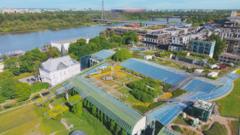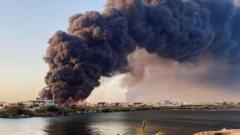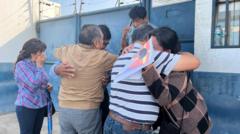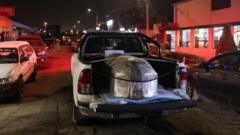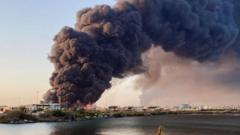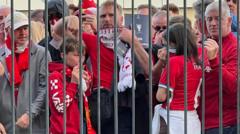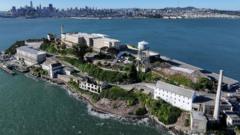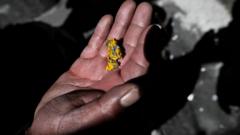Amidst a growing humanitarian crisis in Sudan, South Sudan faces a spike in violence against Sudanese nationals, prompting authorities to enforce a curfew as reports of revenge attacks emerge.
**Violence Erupts in South Sudan Following Attacks on Sudanese Nationals**
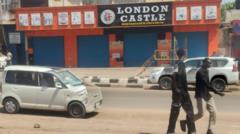
**Violence Erupts in South Sudan Following Attacks on Sudanese Nationals**
A nightly curfew has been imposed in Juba due to escalating tensions and violence against Sudanese residents.
Shops and restaurants in Juba, the capital city of South Sudan, have been largely closed as a nightly curfew, effective from 18:00 to 06:00 local time, was announced by Insp Gen Abraham Manyuat Peter. This decision was made in light of violent confrontations that left three dead and seven wounded, although the victims' nationalities have yet to be revealed. The unrest stems from a series of retaliatory attacks on Sudanese-owned businesses prompted by distressing footage of soldiers allegedly killing South Sudanese civilians in Sudan.
Eyewitnesses reported that Aweil witnessed the torching of three homes belonging to Sudanese nationals, while the police rescued 45 Sudanese traders in Juba who are currently housed in a police station for protection. Following the outbreak of violence, a sense of fear has enveloped Sudanese communities in South Sudan, who are seeking refuge from the ongoing conflict back home.
The local situation has been strained by Sudan's dire humanitarian crisis, with approximately 25 million people in need of urgent aid due to the conflict initiated by rival generals in April 2023. Reports from rights groups indicate that recent ethnic-targeted attacks in Sudan have exacerbated local tensions, causing outrage among South Sudanese, particularly those witnessing the atrocities through social media.
On Thursday, the anger boiled over as hundreds of youths in Juba took to the streets, attacking Sudanese businesses in retaliation for the violence depicted in viral videos. As chaos ensued, police were deployed throughout the capital, while orders were given to protect Sudanese residents. The unrest is prompting drastic economic repercussions in Juba, evidenced by a sharp rise in food prices, and demonstrating an ever-emerging volatility in the region.
In addition to the turmoil in Juba, reports of violence spread to other cities including Wau and Tonj, where spontaneous demonstrations were noted. With officials striving to maintain order and security, the curfew seeks to mitigate further violence and protect vulnerable populations amidst an uncertain backdrop of escalating ethnic tensions and historical grievances.
Eyewitnesses reported that Aweil witnessed the torching of three homes belonging to Sudanese nationals, while the police rescued 45 Sudanese traders in Juba who are currently housed in a police station for protection. Following the outbreak of violence, a sense of fear has enveloped Sudanese communities in South Sudan, who are seeking refuge from the ongoing conflict back home.
The local situation has been strained by Sudan's dire humanitarian crisis, with approximately 25 million people in need of urgent aid due to the conflict initiated by rival generals in April 2023. Reports from rights groups indicate that recent ethnic-targeted attacks in Sudan have exacerbated local tensions, causing outrage among South Sudanese, particularly those witnessing the atrocities through social media.
On Thursday, the anger boiled over as hundreds of youths in Juba took to the streets, attacking Sudanese businesses in retaliation for the violence depicted in viral videos. As chaos ensued, police were deployed throughout the capital, while orders were given to protect Sudanese residents. The unrest is prompting drastic economic repercussions in Juba, evidenced by a sharp rise in food prices, and demonstrating an ever-emerging volatility in the region.
In addition to the turmoil in Juba, reports of violence spread to other cities including Wau and Tonj, where spontaneous demonstrations were noted. With officials striving to maintain order and security, the curfew seeks to mitigate further violence and protect vulnerable populations amidst an uncertain backdrop of escalating ethnic tensions and historical grievances.





